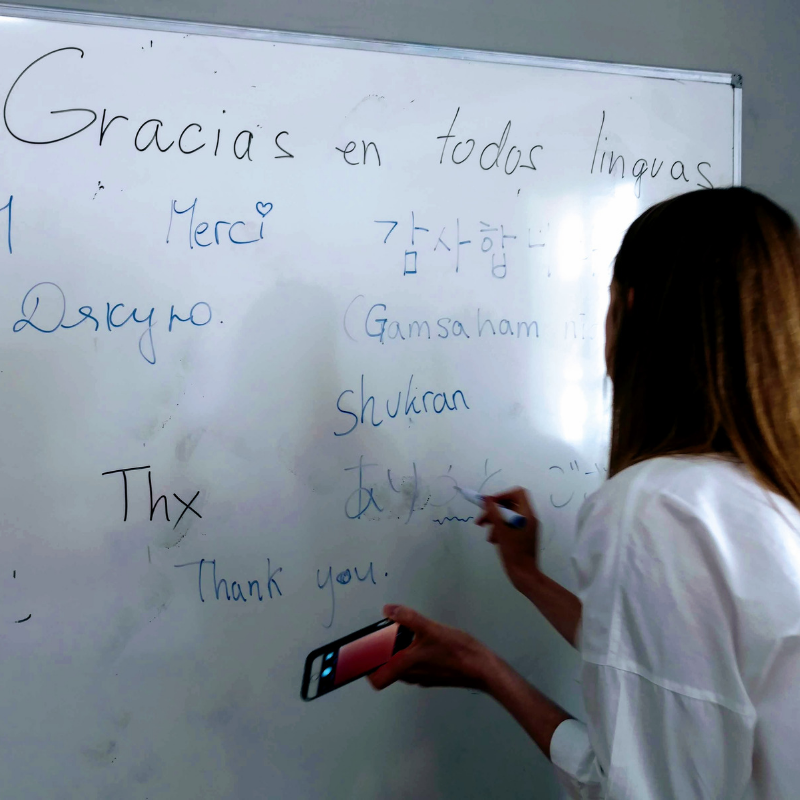By Emily Roth
Before I moved to Spain, I described my level of Spanish as enough to be a good tourist. I could order food from a menu and ask where to find a bathroom. Many friends encouraged me that full immersion in Spanish would be the best way to master the language quickly. They recommended reading the Bible in Spanish and advised me to avoid making friends who speak English. At the time, I agreed with them.
Then I arrived in Spain and met other international workers who chose to attend English church services. I couldn’t understand it. Didn’t they know it was slowing down their language learning? I instead attended a Spanish church filled with local Christians. I didn’t understand much of the worship services and almost nothing of the sermons, but I reasoned that it was worth it to learn Spanish faster.
I threw myself into language study, using various resources and strategies. I tried classes, grammar textbooks, vocabulary flashcards, children’s books, apps, podcasts, language exchange groups, and making local friends. And I saw progress. Over the months, my local friends commented that my Spanish was improving.
But there was a cost. It’s possible that full immersion is the fastest way to learn a language, but it may also be the most stressful and painful. There were days that I felt overwhelmed. I was drowning in Spanish. My brain was pushed to the point of shutting down my ability to communicate, not only in Spanish but in my native English. At these times when I could not express myself in any language, my only way to cope with the intense emotions and exhaustion was to cry.
Besides mental exhaustion, I felt deep loneliness and disconnection. The language barrier made it difficult to form strong friendships, and social activities became just more strenuous language exercises. In groups, I often sat silent, feeling more like an outside observer than a welcomed member because I couldn’t keep up with the pace of conversation.
Another consequence of full immersion was spiritual dryness. I missed the richness of studying the Bible and worshiping with other believers in my heart language. I struggled to participate in the local church community and understand the sermon messages and Bible study discussions.
I began to wonder if full immersion was really the best method of language learning. Did learning a new language have to come with such mental, emotional, and spiritual strain?
When someone begins physical endurance or strength training, they usually experience some amount of muscle soreness. The pain comes from muscle damage. A little soreness can be expected, especially in the beginning of training, but severe pain does not necessarily mean more muscle growth. It can actually slow or stop progress in the case of injury.
I am not a runner. But once I ran a 12K event with no previous training. The next few days, even walking was a challenge. Everything I did hurt. Did the 12K make me a stronger runner? Probably not. If anything, it discouraged me from running more. Often if someone tries to do too much, instead of being motivated to continue, they give up.
Experienced physical trainers recommend a different strategy called progressive overload. This is when exercises become gradually more challenging in repetitions, length of time, or intensity. It means starting with running a mile or doing bicep curls with a 5-pound weight until the muscles can handle a greater challenge. The key is to increase the exercise just enough to challenge the muscles without causing injury or burnout. This is the safest and most efficient method of physical training.
Good language learning is a similar process. Yes, full immersion can produce results, but there are also risks. It works for some people, but there are others who will experience burnout. Depending on the language and the resources available, it may be better for them to apply progressive overload. Maybe they can’t attend an English church service, for example, but they might be able to worship with their family at home or listen to sermons online.
Each person’s needs and situation will be different. Therefore, each person’s pace and process will also be different. If you are a partner of an international worker learning a language, encourage them in their progress and withhold judgment if it seems to be going slower than expected. Pray that God would give them grace in language learning and bless them with the ability to communicate the Good News by whatever means God chooses.


